The Supreme Court’s ruling on abortion as a right available to all women regardless of their marital status is creating a stir – and, for once, it’s for all the right reasons.
The ruling, passed by a three-judge bench of justices D.Y. Chandrachud, A S Bopanna and J B Pardiwala, “can inspire new benchmarks on reproductive rights around the world,” said Human Rights Watch.

A ‘very progressive judgment’ that addresses many of the anomalies in the existing medical termination of abortion rules, said Dr Nikhil Datar, a gynaecologist who has since 2008 helped at least 300 women approach the courts to terminate a pregnancy, and who still has a petition pending in the Supreme Court.
A ‘welcome first step’ said Anubha Rastogi, a lawyer who runs the Pratigya campaign for safe abortion. “But the judges are only interpreting the law. Abortion is not a right available to women, yet.”
The Supreme Court was ruling on an appeal against a July 2022 Delhi high court judgment that told an unmarried woman she could not abort a pregnancy of 23 weeks and five days. She wanted an abortion after her partner had deserted her and she didn’t want the stigma of being an unmarried mother.
But the Medical Termination of Pregnancy rules, expanded in 2021, only included married women whose marital status had changed during their pregnancy, rape survivors, minors, women with mental disabilities, and women pregnant with foetuses that had severe abnormalities. It was silent on single women in consensual relationships.
The Supreme Court gave permission to woman to have an abortion but since her petition involved ‘a substantial question of law’ took it up for further consideration.
(I had written about the earlier ruling on July 24 in Mind the Gap.
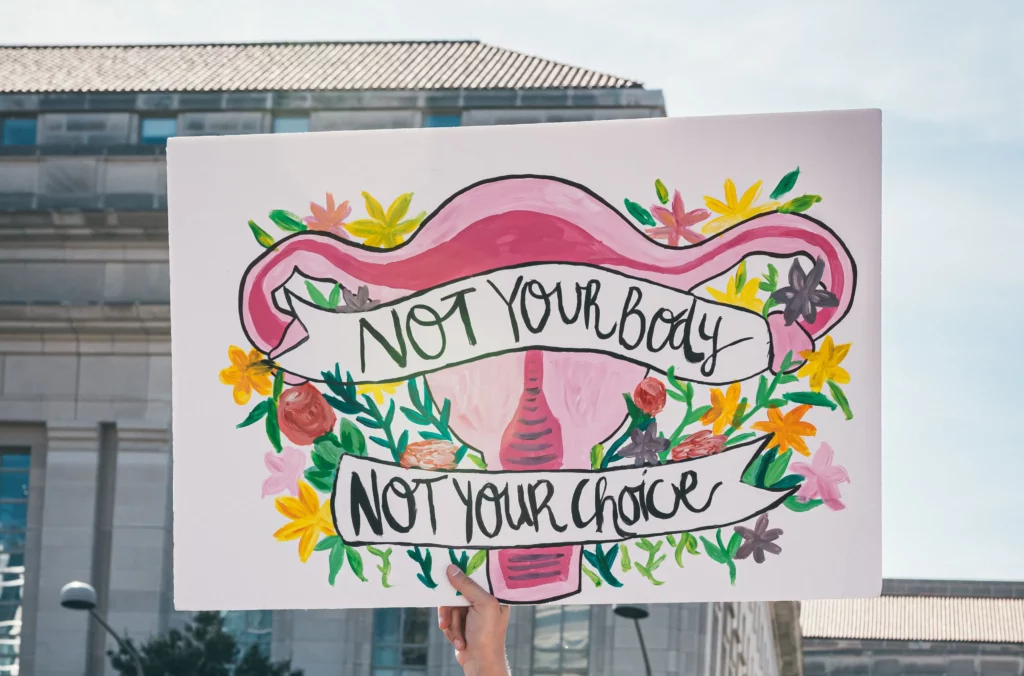
Representational Image (Source: Unsplash)
Here’s why the Supreme Court judgement is remarkable:
Constitutional rights
The ruling is couched in the language of constitutional rights by saying that the exclusion of single women in consensual relationships was ‘unconstitutional’. The MTP rules create an ‘artificial distinction between married and single women’ and this is “not constitutionally sustainable. The benefits in law extend equally to both single and married women.”
It talks of the Constitution as a living document that is capable of promoting and engendering “social change by ensuring that every individual is capable of enjoying the life and liberties guaranteed under the Constitution”.
Acknowledges marital rape
Provided that the wife is a major, Indian law does not recognise forced sex by a husband as rape. The Supreme Court judgment makes clear that the meaning of rape includes sexual assault by husbands, but with a caveat that the reference is restricted to the abortion law only.
The judges were clear that the challenge to the martial rape exception is already pending before a different bench of the court and it was not adjudicating on it.
Expands the definition of ‘women’
At the outset, the judgment clarifies that the use of the term ‘woman’ includes not just cis-gender women but also people of other gender identities who may require access to safe abortion.
“This is a massive expansion of the existing jurisprudence to include protection to trans, non-binary, and gender non-conforming persons, who had previously lamented being left out of the scope of the MTP Act, and faced serious discrimination,” writes lawyer Rohin Bhatt in The Leaflet.
Autonomy of women over their bodies
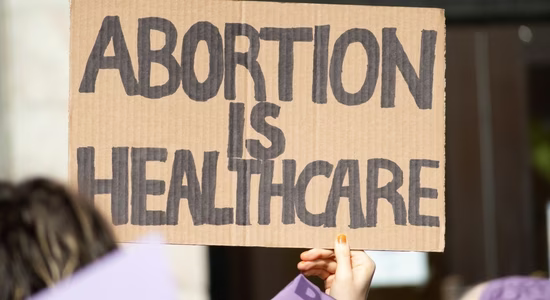
The judgement notes that it is “the right of every woman to make reproductive choices without undue interference from the State.” It invokes Article 21 of the Constitution and states, “It is the woman alone who has the right over her body and is the ultimate decision-maker on the question of whether she wants to undergo and abortion….Depriving women of autonomy not only over their bodies but also over their lives would be an affront to their dignity.”
Nor are doctors required to obtain consent from the girl’s family, documentary proof or judicial authorisation.
Protects privacy of minors
In cases where minors seek an abortion, doctors are not required to report the name of the minor to the police, as currently mandated by the Protection of Children from Sexual Offences Act. Under the Act, any girl below the age of 18 is deemed to be a minor and even if the pregnancy arises out of a consensual relationship, doctors are obliged to report it.
Expands the idea of reproductive rights
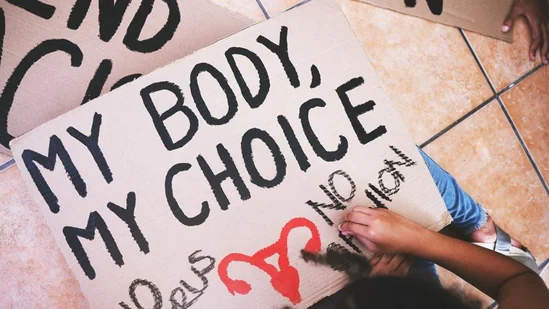
Credit: Shutterstock
The State, observes the judgment, has a positive obligation to protect the health, including reproductive health, of citizens. It calls upon the State to “undertake active steps to help increase access to healthcare (including reproductive healthcare such as abortion).”
It asks the state to ensure :
- Dissemination about reproduction and safe sexual practices
- Access to contraception to avoid unintended pregnancies
- Affordable medical facilities in every district
- The equal and dignified treatment of all patients by registered medical practitioners
Read the judgment here

IN NUMBERS
From 2017-2020, 2.4 million instances of child sexual abuse were reported in India; 80% of these involved girls under the age of 14.
Source: Interpol
WE HEAR YOU
“What is the fault? Somebody will say that she does not wake up in the morning and give my parents tea….Lots of them arise from social norms…from there we attribute faults.”
A five-judge Supreme Court bench headed by Justice Sanjay Kishan Kaul observed that ending a marriage should not require proving a fault in one of the partners. Sometimes a marriage doesn’t work because of irreconcilable differences.
THIS REVOLUTION WILL BE ILLUSTRATED
Some fantastic work emerging out of the ongoing anti-hijab protests in Iran
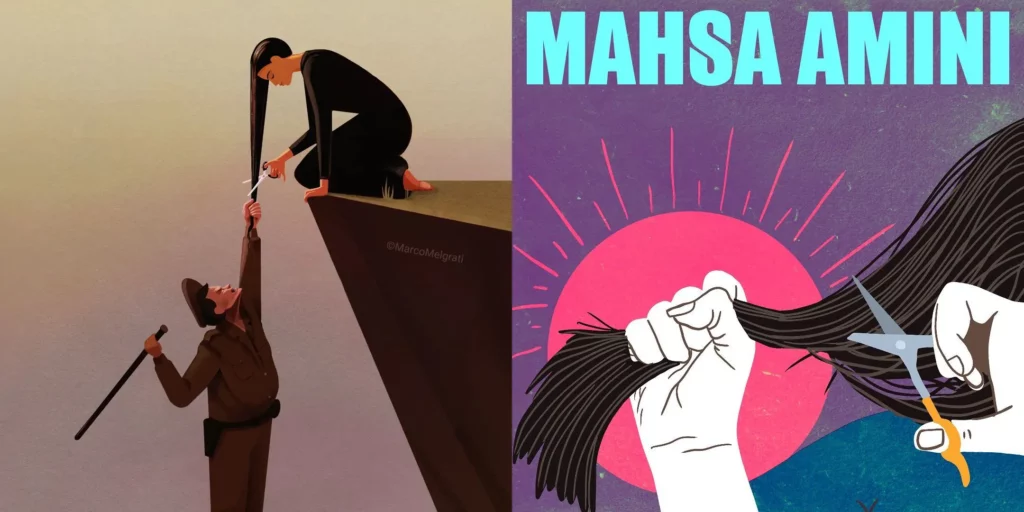
Artwork by m_melgrati (L) and smishdesigns
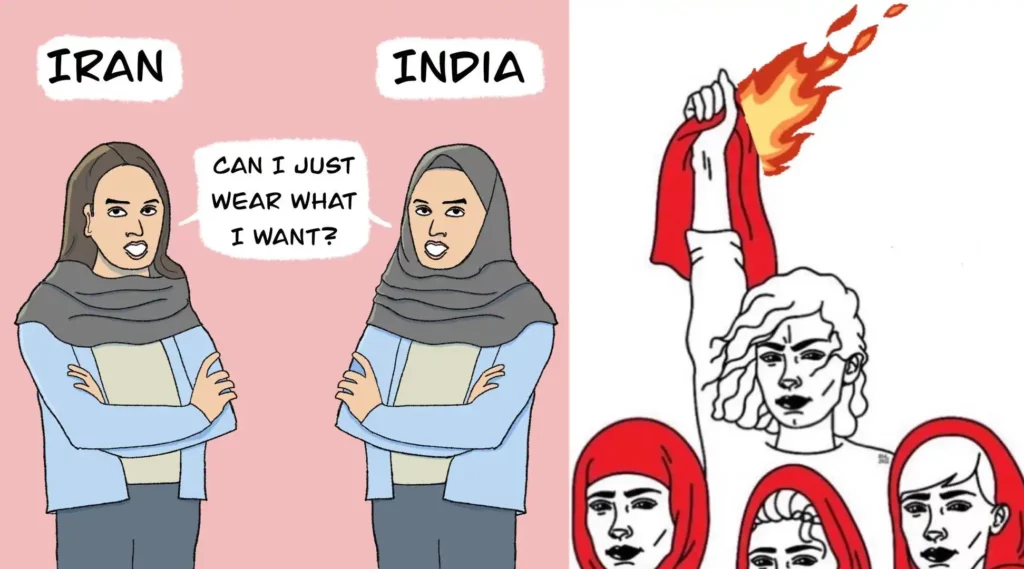
Artwork by penpencildraw (L) and Sharobaala
STORIES YOU MIGHT HAVE MISSED
How not to respond to a murder

Credit : PTI
Somebody in the Uttarakhand government thought it would be a good idea to bulldoze the Vanantara resort, the crime scene where a 19-year-old woman receptionist was allegedly killed after fighting off pressure to sexually service high profile clients.
Her family has alleged that the demolition was done to destroy evidence at the crime scene. The resort’s owner, Pulkit Arya is the son of BJP leader Vinod Arya who has now been expelled from the party. Pulkit has been arrested along with two associates and, according to the police, has confessed to killing the woman.
It took six days after she was reported missing, for the regular police to take over the case, under public pressure, from the revenue police to find the receptionist’s body on September 24 from a canal. An autopsy revealed blunt force trauma before she drowned. Angry locals stormed the unsecured resort and set parts of it on fire.
The body of the daughter of an anganwadi worker and a former security guard from Dobh Srikot village, 130 km from the resort in Rishikesh, was cremated in a hurry late on Sunday night without her mother’s consent, denying her a chance to see her one last time.
A murky picture is gradually emerging of illegal activities, including prostitution and drug use, conducted at the resort. “They used to bring girls…VIPs came too,” an un-named former employee said.
Another Dalit schoolboy dies after a beating by his teacher. UP police arrest his dad
In Uttar Pradesh’s Auraiya district, police booked 286 people, including the father of a 15-year-old Dalit schoolboy who died after a thrashing by his teacher. The people said the people have been booked for ‘rioting’. Protestors blocked the road and set on fire two police jeeps. The boy’s family also refused to cremate his body until the teacher, Ashwini Singh was arrested. The teacher is yet to be arrested.

AROUND THE WORLD
In Cuba, a national referendum has voted to approve a sweeping family law code that will allow same-sex couples to marry and adopt and redefine rights for children and grandparents. The reforms were met by resistance from a growing evangelical movement and it took a government campaign in favour of the measure to approve it, reports Associated Press.
In Italy, a three-party coalition led by Giorgia Meloni’s Brothers of Italy, a descendant of the neo-fascist movement formed by loyalist of Benito Mussolini, is poised to form the country’s first government led by the far-right since the second world war, reports Financial Times. Meloni, who will become Italy’s first female prime minister since the country’s unification in 1861, is known for her stand against immigration, abortion and gay rights.
In the UK, Virgin Atlantic has announced a new gender-neutral uniform policy that gives it staff a choice between a burgundy blazer and trousers with a tie or it red jacket and skirt. The changes are part of a series of updates the airline is making to its inclusivity policies, reports Sky News.
| Were you forwarded this email? Did you stumble upon it online? Sign up here. |
| That’s it for this week. Do you have a tip or information on gender-related developments that you’d like to share? Write to me at: namita.bhandare@gmail.com. |